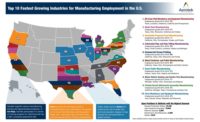ARLINGTON, VA — The Consumer Technology Association’s (CTA) second annual Future of Work survey found 92% of its small business members have a growing need for skilled tech workers—a six point gain—while optimism about finding qualified candidates shrunk two points to 7%. In addition, three quarters (74%) of respondents say it will be hard to find candidates with the right skills, three points higher than last year’s total.
"Although the nation’s unemployment rate is at a nearly 50-year low, there are still millions of unfilled jobs because the skilled talent isn’t there,” said Jennifer Taylor, VP, U.S. Jobs, CTA. “The widening skills gap is one of the biggest hurdles facing American business owners and should be addressed immediately with expanded non-traditional pathways to education if we want to remain a global leader in innovation.”
Despite the growing concern about finding enough skilled tech workers, many companies are looking ahead for ways to reskill their current workforce and retain their top talent. Of the 37% of respondents who anticipate their company will displace workers because of technological change, about half of them (57%) plan to reskill and retain workers at the company.
For example, AT&T launched a $1 billion reskilling effort that includes online courses and collaborations with universities to prepare workers for new jobs and career advancement.
"We actively recruit candidates with tech skills, but the supply is limited and competition is fierce," said Dahna Hull, SVP, human resources, AT&T Communications. "Rather than the wholesale hiring of new talent from outside, we launched several years ago a significant effort to help our employees learn the skills to prepare for the jobs of the future at AT&T. We're working constantly to engage and reskill our over 250,000 employees, and to inspire a culture of continuous learning."
IBM is investing in public school system reform through its Pathways in Technology Early College High (P-TECH) school. The six-year program that bridges the gap between high school and college to help students earn a degree that prepares them for the jobs of the 21st economy.
"The U.S. is facing a widening skills gap, and companies such as IBM are struggling to find employees with the right skills to work in fast-growing technologies," said Kelli Jordan, talent leader, New Collar Initiatives, IBM. "That's why we're shifting mindsets and recognizing that not all candidates need traditional degrees - rather, it's their skills that matter most. With our focus on 'new collar' jobs, IBM is creating pipelines to employment and new opportunities for learning and skill development in emerging technologies such as blockchain, AI and cybersecurity."
Other results of the CTA survey include:
Health insurance (91%), incentive compensation or bonuses (88%), paid time off (87%) and flexible work arrangements (86%) are considered the most important benefits to retain employees;
Technical skills training (80%), retirement plans (78%) and professional development programs to hone soft skills (74%) are viewed as important non-salary benefits;
Attending conferences and events (69%) and internal training classes (58%) are the top training and development programs offered by companies, regardless of size;
Internships (58%), advertising on social media (56%) and online job portals (54%) are the top three strategies used by companies to recruit new talent;
Fifty-four percent of companies have an emerging corporate leadership team dedicated to one or more of the following focus areas: innovation, diversity and inclusion, workforce development, data privacy, education and future of work; and 23percent of respondents plan to hire more skilled tech workers who live in rural areas.
For more information, visit cta.tech.


